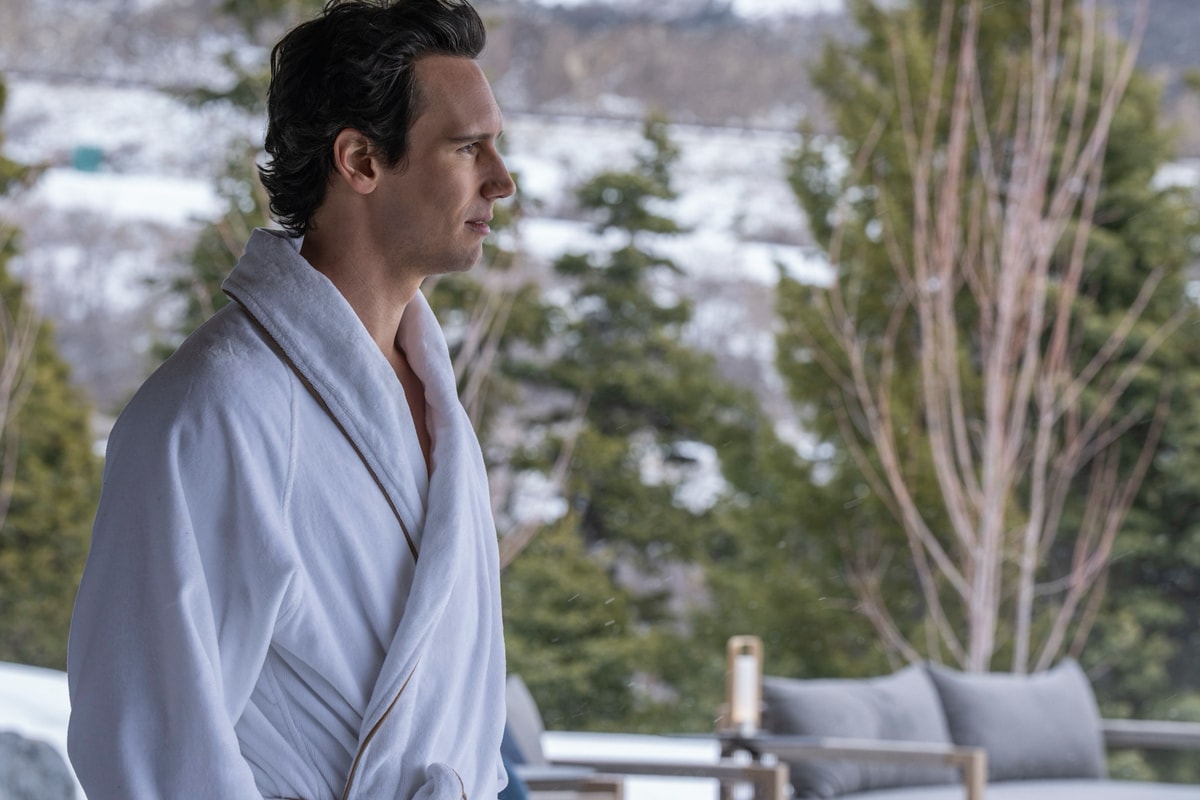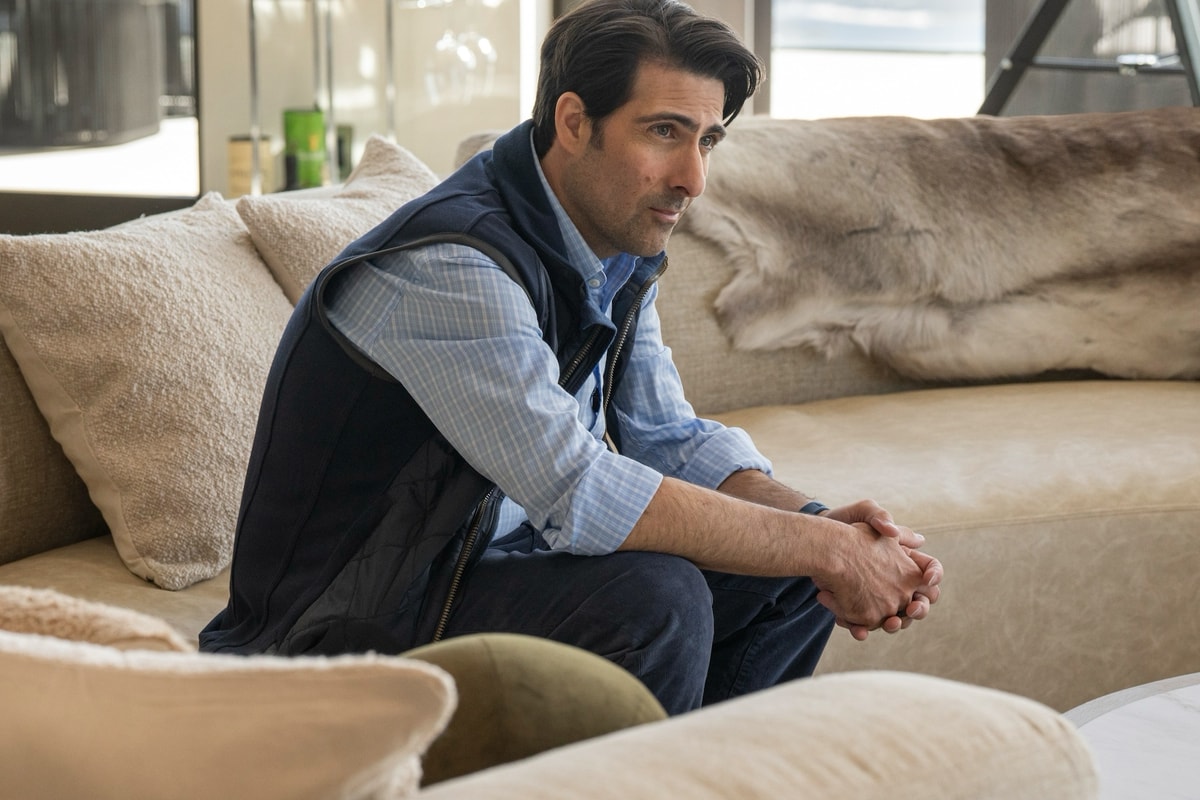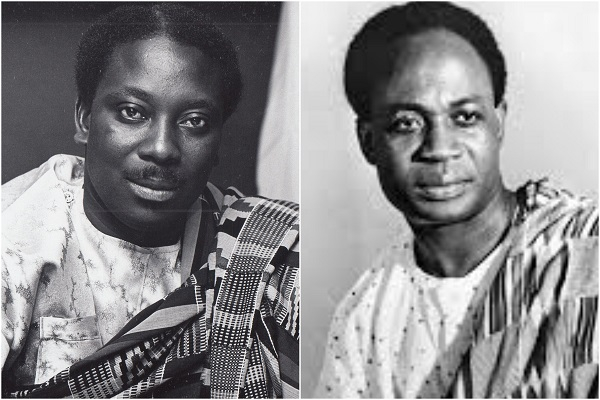Jesse Armstrong, Ramy Youssef, Cory Michael Smith 'Mountainhead' Interview | Hypebeast
Jesse Armstrong had no intention of revisiting the world of the super rich following the end of Succession. “This is a fair question,” the creator, writer and director pointed out. But in 2025, when the world has become heavily reliant on technology and its advancement, he couldn’t help but still be intrigued. About two years after the final episode of Succession aired, Armstrong is back with the Max original film, Mountainhead.
Its genesis began with Armstrong’s book review about Sam Bankman-Fried, the FTX founder who was jailed for fraud, conspiracy and money laundering. Armstrong was in the midst of his research about the disgraced crypto poster boy, and the deeper he got into the rabbit hole, the more he remembered Alexander Skarsgård’s big tech Succession character, Lukas Matsson. His writer instincts kicked in, and he began to hear how those types of people talked and saw the world. The tone was, in essence, set. “That was the thing that clicked and made me think, ‘I want to write in this world,’” he said.
Hanging around in beige rooms and sitting close to fancy cut glass isn’t what interests Armstrong. More than just the wealth, he’s intrigued in the power of the individuals in that room, and just how terrifying it can be to have a select group of people destroy the world with just a click of a mouse.
While both Succession and Mountainhead are both set in the world of the ultra-rich, there’s an evident distinction between the two. Succession was about legacy media, Mountainhead is new media. The film features an all-star cast of Steve Carell, Jason Schwartzman, Ramy Youssef and Cory Michael Smith as four wealthy tech bros who take an alphas-only vacation in an isolated cabin called Mountainhead. The tech giants all have their own issues — Randall (Carrell), who they refer to as “Papa Bear,” is an industry OG who refuses to accept the reality of his cancer diagnosis; Soup Kitchen (Schwartzman), better known as Soups, is desperate to make his first billion and get his meditation app up and running; Jeff (Youssef) is the only one with some kind of moral backbone and is the mind behind a filter for fake content, a platform that Venis (Smith), a social media app founder and the richest man in the world, wants to buy. But his intentions behind the acquisition are questionable at best — just before heading up to the cabin, he unleashed a powerful AI tool allowing anyone to create the most realistic deepfakes of all time. Unsurprisingly, this plunges the world into chaos as authorities and regulatory boards are no longer able to decipher fact from fiction.
1 of 4

Macall Polay/Hbo
2 of 4

Macall Polay/Hbo
3 of 4

Macall Polay/Hbo
4 of 4

Macall Polay/Hbo
Mountainhead, a 90-minute movie, was shot and edited in only about five weeks. With just how rapidly the worlds of tech, politics, business and culture move, it was imperative for Armstrong to run through this process efficiently in order to release it within the same bubble of time as it was written. It proved to be a different experience for him after spending years thinking about what to write in the next Succession script, fully allowing him to transition from a writer to a director. “I was also scared as a first-time director,” Armstrong admitted. “I was a little bit scared of the process, and sometimes, it’s best just to get pushed and jump rather than hang around forever reading lots of books and watching YouTube tutorials about how to be a director. I thought I’d just run at it.”
Youssef and Smith boarded the project without a complete script — a testament to the genius of Jesse Armstrong. “The idea of working with Jesse was so outrageously dreamy that it didn’t matter what it was, to be honest,” Youssef shared. His Jeff and Smith’s Venis are basically on the opposite sides of the same coin. While Jeff can understand the larger situation at hand with some kind of empathy, Venis is incapable of taking any kind of accountability, even if his AI tools kickstarted what seems to be the end of the world.
But don’t be confused — there’s no “morally good” character amongst our four tech bros. Even though Jeff is able to call Venis out for dooming the world, Youssef says his character’s top priority will always be himself. “I loved this wrestling match of being in the neighborhood of integrity or caring about people, but ultimately very much just concerned with his own well-being and his own net worth,” he said. Jeff is, at the end of the day, most interested in monetizing the empathy he feels.
Meanwhile, Smith is fascinated by playing the wealthiest person in the world who answers to no one. “I’ve played some morally questionable people in the past for sure, but I’ve certainly never played the richest man in the world,” he stated. “It’s remarkable to consider being the wealthiest person in the world and what that allows someone to do — the behavior it affords someone to display, and no one can really reprimand this person because they have no power or authority over them in any way whatsoever.”
“People tend to be their funniest when they’re super convicted saying something that they believe in, but that opinion is just insane.” — Ramy Youssef
But both actors stepped into their characters with empathy rather than judgement, which allowed them to understand their characters’ motivations. Smith explained that people like Venis, despite having accumulated all this wealth and power, exhibit behaviors that suggest they’re “stunted in adolescence.” Society’s established power dynamics dictate that the youth’s social currencies can stem from aspects such as physical looks, having extraordinary abilities or even just being extremely outgoing. Folks like Venis who earn these currencies as adults experience a reversion, and it’s evident during their adulthood. “I think that’s part of what’s interesting about these characters in particular, and I think for some other people in the tech industry,” Smith shared.
Youssef shares a similar sentiment, although he doesn’t necessarily find tech bros enchanting. If anything, he sees their behavior as that of kids. He thinks back at his 14-year-old self, who he says was stuck between “confident and arrogant” and “incredibly emotional and insecure.” He shared, “In a way, these guys feel emotionally trapped in time because they’ve spent all their time growing their technology and not really growing their own personal life. Their inner life is kind of lacking a software update. That was very much how I viewed it.”
“They’re not exactly mythical to me,” Youssef continued. “You’re kind of stunned that these are the people who have all the tools and power.”
“None of us know which bit of history you’re living through…The one thing we know is things don’t progress in a simple line.” — Jesse Armstrong
In true Jesse Armstrong fashion, these truths are packaged with a comedic punch. There’s a reason why Succession won the Emmy for Outstanding Writing for a Drama Series four times during its run — the humor is in the writing. Armstrong’s penchant for navigating difficult topics and the cast’s ability to play it straight give Mountainhead its rare breed of satire. “People tend to be their funniest when they’re super convicted saying something that they believe in, but that opinion is just insane,” Youssef explained. “That’s why I think my family’s always made me laugh. They’re not trying to be funny, it’s just what they think is nuts.”
This fusion plays out masterfully with Randall, Soups and Venis’ plan to kill Jeff. After they find out that their dear friend is a pro-Washington type of tech billionaire, they tell each other (and themselves) that Jeff is in the way of humanity’s evolution. The reality of taking your friend’s life isn’t necessarily what makes these scenes so eerily funny, it’s watching how they slowly convince themselves that it’s the right thing to do. Smith personally called it “the greatest lesson in comedy,” giving Armstrong and his scene partners, Schwartzman and Carell, their flowers.
“It’s a crucial moment, right? I think it feels quite like the work that I’ve been involved with, especially Succession, but the tone is quite different, and that scene is maybe a pivotal one,” Armstrong shared. He explained that it had to be believable from the start, especially considering that it was about getting your friends or colleagues on board to commit such a heinous act. “It was a technical challenge, which I really enjoyed. And I have to say, it’s one of the most exciting scenes I’ve ever been involved with shooting,” he continued. “Watching those three brilliant comic actors play off each other with quite a dramatic frame, it felt like I’d given them good ammunition.”
Although the experience of Mountainhead almost feels like a bleak glimpse into our near future, Armstrong himself can’t tell which part of society’s storyline his film portrays, “None of us know which bit of history you’re living through. Is this the beginning of something? When you think of populists like Donald Trump in America, is this the beginning of a run of such figures or is it something you’ll look back on and say it’s an anomaly?” He added, “The one thing we know is things don’t progress in a simple line. So wherever you think you are, you’re probably not. That’s the only thing you definitely know: you’ve probably got it wrong.”
“It’s remarkable to consider being the wealthiest person in the world and what that allows someone to do — the behavior it affords someone to display, and no one can really reprimand this person because they have no power or authority over them in any way whatsoever.” — Cory Michael Smith
With the popularity of projects like Succession, Mountainhead and even The White Lotus, Armstrong believes that society as a whole is slowly becoming more aware of plutocracy and technocracy’s effects. He harks back to classics like Dallas and Dynasty, sharing that there’s always been an interest in wealth and how it’s played out on screen. The sense of unbalance, which is often tucked away, could be a reason as to why audiences, writers and directors are so drawn to that world.
But Mountainhead plays on a line where it can be viewed as both a comedy and a tragedy — it’s the Four Horsemen of the Apocalypse meets the Three (in this case, four) Stooges. Armstrong hones in on his observation that tech giants tend to pick out bits of philosophical theories (Pluto is a big one for Randall) to bolster their self-perception, as well as the perceived importance of their work. He likens these philosophical concepts to “another set of brand names to be surrounded by. “It wasn’t so much the specifics of like, a Hegelian or stoicism approach that appealed when I was thinking about them,” he clarified. “It was more like, ‘Oh, if you’re that kind of guy who categorizes everything, who cut zero-bases everything and convinces themselves they’re thinking from first principles — irrespective of what they want — then it’s really nice to be bolstered by some big names from the history of philosophy.’”
As Mountainhead makes its global debut, it serves as a timely and unsettling reflection of what reality could slowly become. Jesse Armstrong and the cast’s mastery of modern satire invites us to confront the uncomfortable truths about power, wealth and humanity’s evolving relationship with technology. More than anything, it presents itself as a reminder that sometimes, the most profound insights are found in the most absurd and darkly comedic corners of our world.
Mountainhead is available to stream on Max now.












